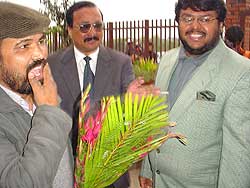 You can see them looking over the shoulder, under the table, behind the curtain and reading between the lines. Our leaders appear as clueless as the rest of us when it comes to current affairs. Three of the four major mainstream bosses who insisted they would accept nothing less than a joint audience with King Gyanendra opted for individual consultations.
You can see them looking over the shoulder, under the table, behind the curtain and reading between the lines. Our leaders appear as clueless as the rest of us when it comes to current affairs. Three of the four major mainstream bosses who insisted they would accept nothing less than a joint audience with King Gyanendra opted for individual consultations. From reports appearing in Nepali Congress-friendly press, it seems the facilitator was CPN-UML general secretary Madhav Kumar Nepal. His contention that rejecting one-on-one meetings with the monarch in the post-ceasefire context would be disrespectful of the crown and a dereliction of duty. The exhortation impressed Nepali Congress president Girija Prasad Koirala and Nepal Workers and Peasants Party chief Narayan Man Bijukche. United People's Front leader Amik Sherchan chose to stick with the original stance, ostensibly because he had the least to lose.
As the trio got back together to compare notes, pro-Koirala quarters started suggesting that Nepal had played a more active and less altruistic part in seeking a patch-up with the palace. Having tamed Khadga Prasad Sharma Oli and tormented Bam Dev Gautam within the party, Nepal evidently felt confident enough to mount another bid for the premiership. Chand, too, was happy to use his good offices once he got Nepal's personal word that all four would attend. Given the circumstances, Nepal's ability to make good on 75 percent of his pledge must have gone well with the premier.
We shouldn't be uncomfortable with the ease with which the ex-leader of the opposition asked the premier to schedule an appointment with the king. Nepal may not recognise Chand in his official capacity, but he knows the value of informality at a time when proximity to power equals the real thing. Moreover, most of the leaders who have been boycotting Chand's all-party conferences regularly receive the premier at home or accept his phone calls.
Before we could contemplate the mainstream's next move, though, the Maoists stepped in and firmly positioned themselves on both camps. Through the code of conduct, they have committed themselves to fostering far-reaching change with palace representative Narayan Singh Pun. As part of the Eleven Reds, they have fortified the campaign to preserve the gains of 1990. For now, Dina Nath Sharma is taking care of the parliamentary flank. To sense the significance of Sharma's deputation, it's not enough to read his latest plea for selfless contributions from the three power centres to prevent Nepal from becoming an alien nation.
You have to recall how he went on BBC Hindi Service last May to retract Prachanda's reported ceasefire offer, arguing that the rebels would have to be crazy to do that while they were winning the war. Krishna Bahadur Mahara, who went on CNN six months later to castigate world leaders for lacking ideological conviction, is dropping clear hints of a revision of the Maoist stance on the monarchy.
Politicos of all persuasions have been re-reading US Deputy Assistant Secretary of State Donald Camp's remark that Nepal is one of the few places in the world where American, Chinese and Indian interests are in perfect consonance. (Just in case you missed it, Camp met Chand on 21 October to assure him of continued American support, while the newly disenfranchised political class was making fun of the new premier's failure to win international recognition.)
Considering the Bush-Blair convergence on the post-9/11 world, we probably shouldn't read too much into Camp's omission of Britain in that particular sentence. In any case, Britain's special representative for Nepal, Sir Jeffery James, arrived to express confidence that everyone would support the peace process. Indian Ambassador Shyam Saran, despite his clear reservations on the desirability of third-party mediation (Nepali Times interview, #136) agrees Nepal needs a supportive international environment. China, maintaining its characteristic circumspection, must have conveyed its considerations to the concerned quarters.
Amid the confusion reigning supreme left, right and centre, one thing stands out. When the joint audience takes place, our leaders would demand a reinstatement of the House of Representatives and the setting up of an all-party government, though not necessarily in that order. That would effectively rule out the possibility of the Maoists' heading the new government, something Comrade Prachanda and Baburam Bhattarai have been alluding to from the moment the truce took effect. Having come this far for peace, they might accept the ground realities. How would that affect the rebels' morale? Or Chand's? Most Nepalis are in favour of an all-party government (Nepali Times/Nepalnews.com Weekly Internet Opinion Poll # 76). Some 13 percent of the respondents want parliament restored. Over twice that number prefer to see the Chand government continue until the next polls. After all we've been through these seven years, we know for sure that no concern is inconsequential enough to be ignored.


